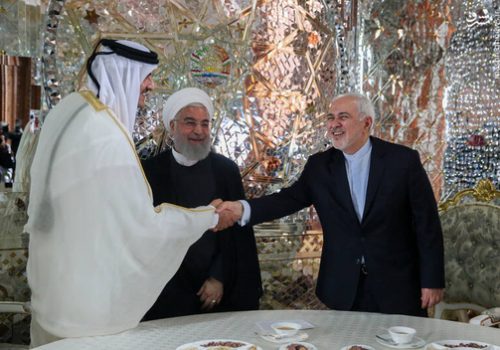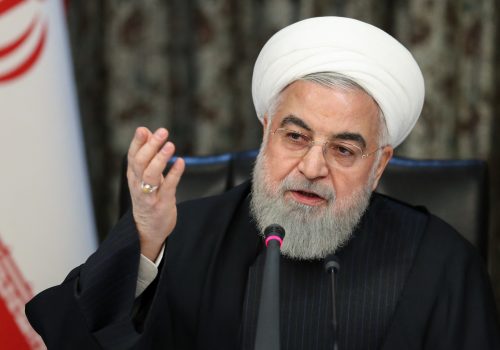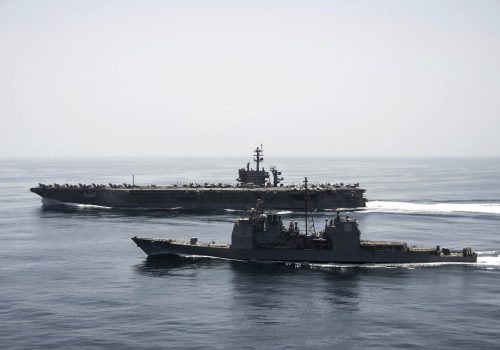With the boycott over, Qatar tries to reclaim top regional mediator role
The January 2021 al-Ula declaration that effectively ended the political and economic boycott of Qatar imposed by Saudi Arabia, the United Arab Emirates (UAE), Bahrain, and Egypt, has been interpreted in Doha as a victory in terms of regional politics.
After defending itself against its Gulf Arab neighbors’ accusations of being too comfortable with Turkey and Iran, Qatar now feels vindicated in its policy of deepening its diversification of regional relations. Indeed, Qatar is trying to use its connections to both Turkey and Iran—which ironically became much closer in the past three years out of economic necessity due to the boycott—to re-position itself as the key regional mediator it was before the 2011 Arab Spring.
In recent weeks, Qatar has offered to mediate between Iran and the United States given Doha’s warmer ties with Tehran, while it hosts the largest U.S. military outpost in the Middle East between Iran and the Persian Gulf monarchies (especially Saudi Arabia) over their regional divide and between Turkey and Saudi Arabia over their rift. On February 15, Qatari Foreign Minister Sheikh Mohammed bin Abdulrahman Al Thani visited Tehran for talks with his Iranian counterpart, Mohammad Javad Zarif, in which they discussed bilateral ties the nuclear deal, and, more importantly, Doha’s potential role as mediator between the Gulf neighbors and Iran.
Doha’s recent calls and actions are more intriguing as they happen while the ink is still drying on the al-Ula declaration, with none of the boycott’s underlying causes resolved. In fact, the cold détente seems to be mostly a bilateral play, led by Saudi Arabia and quite icily received by the other members of the former boycott front. Bahrain—which is dependent on Riyadh and has its own problems with Tehran—issued a January 21 statement recalling the number of grievances by the blockade-imposing quartet. It is an apparent dismissal of any mediation role assumed by Doha on the grounds that it is still too lenient on Iran and thus unfit to act as arbiter with Tehran. The UAE, while publicly supporting the détente, has also been cautious on the prospect of re-embracing Qatar as a full partner, given the Emiratis’ perceptions of Turkey as their main strategic rival. Egypt is carrying on its own negotiations with Doha to fully move ahead with bilateral relations and mostly eyes the economic opportunities that could come with normal ties.
This set of circumstances reflects deep-seated mistrust driven by a wide gulf of perceptions and positions between Qatar on one side and Saudi Arabia, the UAE, and Bahrain on the other. This is especially true about anything Iran-related. Riyadh, Abu Dhabi, and Manama are looking for a partner that would support their core demand related to reviving the Iran nuclear deal. This is so that the Joe Biden administration does not repeat the course of the Barack Obama administration, which was perceived as having completely ignored the Arab trio’s concerns on getting the Joint Comprehensive Plan of Action (JCPOA) across the finish line. Iran’s three Arab foes are much more interested in the future of Iran’s ballistic missile capabilities and its regional military interventions than they are in Iran’s uranium-enrichment levels. They are looking for an interlocutor with the ability and interest to persuade Washington to retain some sanctions against Iran and use them as leverage to push Tehran to engage on those two issues once the JCPOA is revived.
This is not what Doha is planning, however. Instead, Qatar may hope to replace the so-called Oman channel, which was set up in 2009 as a venue for confidence-building measures between Tehran and Washington and later became host to serious negotiations that paved the way for the JCPOA. Now, the two key figures of that channel are no longer in the picture: chief architect Sultan Qaboos bin Said al-Said died in January 2020 and his long-time foreign minister, Yusuf bin Alawi bin Abdullah—in office since 1997—has retired. The new Sultan of Oman, Haitham bin Taqiq al-Said, is prioritizing his country’s economic and financial challenges and intends to steer away from the geopolitical risks associated with playing the delicate role of mediating with Iran. Asked about resuming this mantle, the new Omani Foreign Minister, Sayyid Badr Al-Busaidi, told the Atlantic Council on February 11 that there was no need, as “I believe the channels are open directly between the foreign policy team in Washington and Iran.”
Doha is displaying its ambition to act as a major political venue as seen in the talks it has hosted between the US and the Taliban in Afghanistan, offering its services to the new US administration in a bid to enhance its geopolitical-diplomatic clout. But, as the Omani foreign minister’s comments at the Atlantic Council reflected, Washington and Tehran may not need a regional mediator this time around. The Biden team includes figures who were actively and personally involved in the original JCPOA negotiations and who should be able to re-establish direct contact. Should an outside mediator be required, given the absence of US–Iran diplomatic relations, this might be Switzerland, which already represents US interests in Iran.
For its part, Tehran would also prefer a direct channel with Washington. Although Tehran’s ties with Doha deepened during the blockade, Iran cannot fully trust Qatar given the importance of US ties to the latter, especially in regard to US military presence as a major security guarantee for Doha. In this context, it is indicative to point to Tehran’s January 24 rejection of a Qatari mediating role over a dispute involving the Islamic Revolutionary Guard Corps’ seizure of a South Korean-flagged tanker. Doha’s mediation offers could also simply be a signal of goodwill to Tehran, given the fact that Iran has been on the losing side of the conclusion of the Qatar crisis, both geopolitically—as Tehran tried to leverage intra-Gulf divisions—and financially—with Qatar Airways now able to fly through Saudi airspace again instead of Iran.
In sum, whatever the goodwill from Doha, there is unlikely to be much fire behind the smoke of Qatar’s mediation rhetoric. In fact, given its apparent failure to seek prior coordination with fellow Gulf Cooperation Council (GCC) states before publicly issuing such mediation offers, Doha’s calls may indeed produce the opposite result of what they are declared to seek, namely entrenching mistrust within a still to be revived GCC.
Dr. Ali Fathollah-Nejad is author of the forthcoming Iran in an Emerging New World Order: From Ahmadinejad to Rouhani. He is a former fellow at the Brookings Institution in Doha (BDC) and the German Council on Foreign Relations (DGAP).
Dr. Cinzia Bianco is a senior advisor at Gulf State Analytics and a Gulf Research Fellow at the European Council on Foreign Relations (ECFR).
Image: Qatar's Emir Sheikh Tamim bin Hamad al-Thani signs a document during the Gulf Cooperation Council's (GCC) 41st Summit in Al-Ula, Saudi Arabia January 5, 2021. Bandar Algaloud/Courtesy of Saudi Royal Court/Handout via REUTERS


